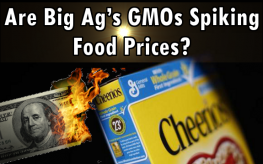Companies Say Going Non-GMO is Difficult: Are Big Ag’s GMOs Spiking Food Prices?
Companies Say Going Non-GMO is Difficult: Are Big Ag’s GMOs Spiking Food Prices?

Some U.S. food companies are in a mad-dash to provide consumers the non- GMO foodsthey have been begging for. As more and more people demand food devoid of genetically altered and transgenic manipulations offered by the biotech industry, others are complaining that providing GMO-free food for the masses is going to be costly. Industry expertsare warning that the growing non-GMO is going to result in higher food prices, largely due to the pervasiveness of RoundUp Ready crops that were introduced to ‘help farmers’ fight insects that might devour their crops. Now – it seems farmers have another concern, that GMO will actually devour their profits.
Organic farmers are concerned about cross-pollination, and this is part of the problem with allowing Monsanto to make decisions about the world food supply. Non-GMO sugar and corn are especially hard to find in the US, now due to the fact that over half of our land, more than 12 million acres, have been infested with genetically modified versions of seed.
And these GMO seeds are back-firing on farmers who thought that planting them would make life as a farmer easier. Superweeds are taking over.
As the Ottawa Citizen explains,
“The resilience of nature is evident across almost five million hectares of superweed-infested U.S. farmland. Some runaway weeds in the southern U.S. are said to be big enough to stop combines dead in their tracks.”
Read: The Cost of GMO Labeling – How Much Will it Cost Consumers?
The Organic Necessity
Therefore, complaints by the Grocery Manufacturer’s Association and other big food corporation are not without teeth. Sourcing commodities needed for its packaged food products can be difficult due to the industry’s practices and the ongoing malarkey of the FDA and USDA, as well as other regulatory bodies who should have stopped GMO before it got this out of control. . .however, there are other companies making the strides to provide non-GMO to their consumers.
Furthermore, people also are willing to pay a little more for real, natural, non-GMO food, instead of cardboard filled with toxins and devoid of any nutrients. It’s why some people buy non-GMO sprouted quinoa bread and others by Wonder bread. One loaf can cost over $8 and the other a fraction of that, but the merits of eating one over the other are arguably extensive.
Nonetheless, General Mills has said that it is spending millions to install new equipment for processing non-GMO ingredients and setting up the handling and transportation of such goods. They say it isn’t easy to keep the GMO-free items separate from the GMO-contaminated ones. Tom Forsythe, the company’s communications director, said that General Mills made the decision, though it was a sizeable investment because the company knows it is what consumers want.
The true risk is that companies who aren’t willing to invest in non-GMO products for consumers are likely to go bankrupt. There are currently thousands of products made by hundreds of companies that don’t contain GMO, and a listing of these is available at the Non GMO Project’s website. There are also farmer’s markets and organic co-operatives, as well as a rising tide of people willing to even grow their own food instead of purchasing GMO cross-breeds that can harm their families.
Companies like Whole Foods Market ( WFM.O) will label all GMOs by 2018, and Chipotle Mexican Grill Inc ( CMG.N) said last year that it was switching to non-GMO ingredients in its chain of 1,550 restaurants. There are people heeding the call of non-GMO activists.
It goes back to the fundamental issues of our food supply being run by corporate interests, and why there are multiple studies proving that Big Ag and monocrop monopolies aren’t going to feed the world. Small organic farms and heavy legislation against Monsanto – along with getting their stooges out of our government agencies – will go a long way to lessen spikes in food prices.
We may have to burn all those fields and start over, but it wouldn’t be so different from old slash and burntechniques used in farming practices for centuries. It is time to oust Monsanto, Dow, Syngenta and others, and start fresh. We can take back our food supply, even if its one acre at a time.
| About Christina Sarich: | |
| Christina Sarich is a humanitarian and freelance writer helping you to Wake up Your Sleepy Little Head, and See the Big Picture. Her blog is Yoga for the New World. Her latest book is Pharma Sutra: Healing the Body And Mind Through the Art of Yoga. | |
Other Popular Stories:
Get The NaturalSociety Natural Health Newsletter!
Post a Comment